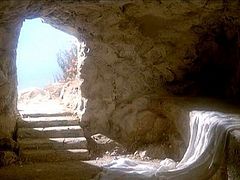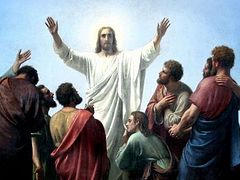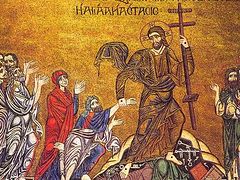A Clear Vision of Christ's Resurrection
Most men believe in the resurrection of Christ, but very few have a clear vision of it… That most sacred formula which is daily on our lips does not say, “Having believed in Christ’s resurrection,” but, “Having beheld Christ’s resurrection, let us worship the Holy Lord Jesus, who alone is without sin.”
How then does the Holy Spirit urge us to say, “Having beheld Christ’s resurrection,” which we have not seen as though we had seen it, when Christ has risen once for all a thousand years ago, and even then without anybody’s seeing it? Surely Holy Scripture does not wish us to lie? Far from it! Rather, it urges us to speak the truth, that the resurrection of Christ takes place in each of us who believes, and that not once, but every hour, so to speak, when Christ the Master arises in us, resplendent in array and flashing with the lightnings of incorruption and Deity.
For the light-bringing coming of the Spirit shows forth to us, as in early morning, the Master’s resurrection, or, rather, it grants us to see the Risen One Himself. Therefore we say, The Lord is God, and He has given us light (Ps. 118:27), and we allude to His second Coming and add these words, Blessed is He that cometh in the Name of the Lord (Ps. 118:26).
Those to whom Christ has given light as He has risen, to them He has appeared spiritually, He has been shown to their spiritual eyes. When this happens to us through the Spirit He raises us up from the dead and gives us life. He grants us to see Him, who is immortal and indestructible. More than that, He grants clearly to know Him who raises us up (Eph. 2:6) and glorifies us (Rom. 8:17) with Himself, as all the divine Scripture testifies.
These, then, are the divine mysteries of Christians. This is the hidden power of our faith, which unbelievers, or those who believe with difficulty, or rather believe in part, do not see nor are able at all to see.
To the Assembly of the Saints
St. Constantine the Great, Oration
That light which far outshines the day and sun, first pledge of resurrection, and renovation of bodies long since dissolved, the divine token of promise, the path which leads to everlasting life—in a word, the day of the Passion—is arrived, best beloved doctors; and ye, my friends who are assembled here, ye blessed multitudes who worship Him who is the author of all worship and praise Him continually with heart and voice, according to the precepts of His holy word.
But thou, Nature, parent of all things: what blessing like to this hast thou ever accomplished for mankind? Nay rather, what is in any sense thy workmanship, since He who formed the universe is Himself the author of thy being? For it is He who has arrayed thee in thy beauty; and the beauty of Nature is life according to Nature’s laws.
But principles quite opposed to Nature have mightily prevailed, in that men have agreed in withholding His rightful worship from the Lord of all, believing that the order of the universe depended, not on His providence, but on the blind uncertainty of chance. And this they did, notwithstanding the clearest announcement of the truth by His inspired prophets, whose words should have claimed belief, but were in every way resisted by that impious wickedness which hates the light of truth and loves the obscure mazes of darkness.
Nor was this error unaccompanied by violence and cruelty, especially in that the will of princes encouraged the blind impetuosity of the multitude, or rather itself led the way in the career of reckless folly.
Such principles as these, confirmed by the practice of many generations, became the source of terrible evils in those early times: but no sooner had the radiance of the Savior’s presence appeared, than justice took the place of wrong, a calm succeeded the confusion of the storm, and the predictions of the prophets were all fulfilled.
For after He had enlightened the world by the glorious discretion and purity of His character, and had ascended to the mansions of His Father’s house, He founded His Church on earth, as a holy temple of virtue, an immortal, imperishable temple, wherein the worship due to the Supreme Father and to Himself should be piously performed
The Constant Pascha
Homily on the Eve of the Leavetaking of Pascha, by Metropolitan Saba (Esber)
Tomorrow evening we say goodbye to the Feast of Pascha. For forty days, we are in the midst of the joy of the resurrection. For forty days, we chant with joy,
“Christ is risen from the dead, trampling down death by death, and upon those in the tombs bestowing life!”
at the beginning and the end of every individual or group prayer, at home or in the church. There is an Orthodox tradition in which Christians substitute “Christ is risen!” for their everyday greetings for the forty days that follow Holy Pascha.
Tomorrow, we will say goodbye to the services of Pascha, while its spirit will remain with us, since we cannot live without it.
And if Christ is not risen, your faith is futile; you are still in your sins! (1 Corinthians 15:17).
Christ’s Resurrection loads us up with hope, strength, action, steadfastness, and the best life, which is always to come! It provides us with the strength to rise after every time we fall, to start building after every collapse, to once again spread the joyful spirit of life after every catastrophe– and there are so many in our tormented world! You live the resurrection every time you return in it to yourself and pay attention to what you have missed, when you rise to make right the sins you have realized, in yourself and in your society. You live the resurrection when you realize that you are a child of life– not passing, temporary life, but eternal, lasting life– a child of the life that brings tenacity out of pain, patience out of trials, strength out of weakness, joy out of sorrow, and hope out of despair.
Your believing in Christ’s resurrection from the dead means that you believe in your own resurrection and so in the resurrection of the world from every death. Or rather, you translate it in your life into resurrectional action, and so you are not happy to remain as you are, so you continue the struggle, seeking what is higher and better, striving for the good portion, which will not be taken from you (cf. Luke 10:42). A Christian is a person of the resurrection, in the sense that he lives the resurrection at every moment. Otherwise, he has not yet stepped onto the threshold of Christianity. If he languishes under a death, then he will quickly perceive his weakness and return to raise himself up by the grace of the resurrection of his Lord, to remain in the mystery of the resurrection, despite the many forms of death that may surround him. He receives from his risen Christ the pulse of life, hope, optimism and especially a correction of vision toward the highest and most fundamental purpose of his life.
These are nice words, but how are they lived? How are they realized in daily life? We have memorized the golden answers to this by heart. Most of the time, we repeat them without any internal awareness. We say: Christ rose to grant salvation to humankind and to open to them the way to the second life, which had been closed by Adam and Eve’s departure from living in the shelter of God. He rose to grant us the power to live eternal life, this that had been constantly forgotten by humankind. He rose because God does not die. And other correct answers that we have become accustomed to repeating. But we often forget that their live and demonstrable activity within us is the most important thing.
A person is aware of the activity of the resurrection and lives it when he realizes that he is created for eternal life and arranges his life on the basis of that conscious realization. He sees that he will not live upon this earth more than a number of years that, no matter how long, will not be more than a hundred in the best of circumstances, most of which are labor and sorrow, as the Psalm says (Psalm 90:10). He is aware that he is created for unending life and not to pass away with the passing away of his earthly life, but that it only starts in its fullness at that moment.
This consciousness grants him a new reading of his earthly life, its pains and difficulties. He sees in it what he did not see before and realizes that through his resurrectional faith he is able to derive benefit from it for himself and for others. The words of the Apostle Paul become true in him,
All things work together for good to those who love God (Romans 8:28).
In the cross, he sees joy and consolation because it makes it possible for him to struggle and ascend. He learns patience, kindness, mercy and sensitivity to those in pain, those suffering, those who are abandoned and acquires from his Lord an inexhaustible wellspring of tender compassion that can only be acquired through sincere suffering. He experiences the serene joy that wells forth from the presence of his Lord within himself, where he had prepared a place for Him and He will come to him and make a home with him (cf. John 14:23). He tastes the peace that no evil, no matter how great, can take away from him (cf. John 14:27).
The best sign that we have attained this level of faith is the degree to which we have been freed from that which binds us in this world and its lusts. Seeking eternal life requires of us constant change and an experience of God’s presence in our life. So let us love simplicity of life. Let us seek the essence and not give any importance to showiness material gain. Let us be strangers to extravagance and spectacle and instead be disgusted by them. Let us feel the suffering of others and be delighted to share in it with them. Let us sit, like Mary, at the feet of the Lord because our joy at that point is indescribable. Those who have touched it experience the grace of the resurrection and have truly known a change of mind and thus a change of their entire being.
The cross leads those of little faith to disbelief and perplexity, but it brings those who believe to grasp the most perfect meaning of life. The unbeliever detests hardship, trials and suffering and so despairs and rages at life, taking vengeance out on others, and his despair may lead him to suicide since he has no hope. The true believer sees ways to transcend his stumbles and space to make his love active, to give life to his faith, and a resurrection unto the best life, which leads him to thank God in good times and bad.
Many seek joy in the wrong place. They become dejected at the plight of our country and flee to a way out. They vent their anxiety and seek an outlet in things that grant them imagined happiness and temporary joy, winding up with what they had sought to replace and finding themselves in greater anxiety and deeper fear. Is there any clearer sign of the absence of the resurrection from our lives than our failure to realize it despite the adversities and fears that we are experiencing on account of what is happening in our country? If the resurrection is not present in us today, when will it be?
The Leavetaking of Pascha, tomorrow, is a reminder to us to live it throughout the year.




